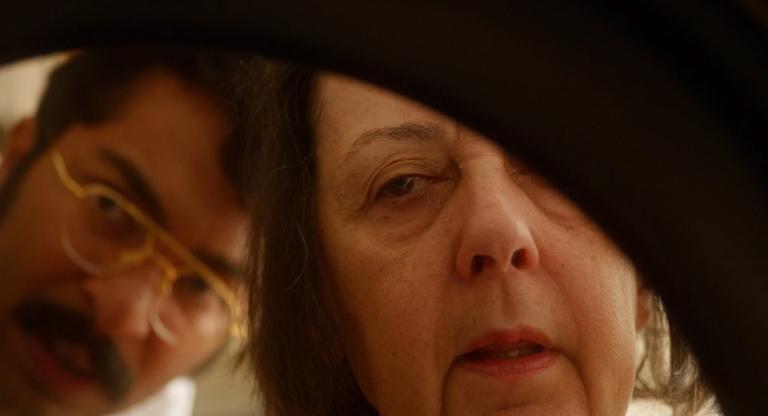A dent, a gouge, a slight hollow. The trace of impact, the evidence of action. In The Dent (2014), by the Egyptian-born, Swiss-based artist Basim Magdy, a depression on the façade of a white-gray steel structure reappears throughout. The film, which is set to a non-lyrical, melodic score, features subtitles that at one point read: “it all started with a dent that hung like a ghost.” The 19-minute film narrates a fictional story of a small town’s futile bid to host the Olympics. Its residents put together various plans for greatness but fail again and again. Their hopes run dim as the town becomes worn down, dented by its own ambition. The dent metaphorizes bruised morale and bears the trace of some unknown past, an eroded present, and visions of a more pristine future—one that has always yet to arrive.
In this film, as in others in the program, Magdy’s visual worldbuilding consists of a stream of associative images and disparate, loosely connected narrative threads. Dents surface in the materiality of the film, which seems to have literally been warped, bent, and dented. Drawing on materialist filmmaking alongside his own painting practice, Magdy treats film as a decidedly physical, tangible substance. In the film, Magdy’s first experiment with Super 16mm, he toys with the footage such that segments are double exposed, images appear blurry, and scenes run backward. The result plays out in murky, poetic sequences of vibrant, saturated hues. The hallucinatory effect of these visuals is both completed and confused by the written language of Magdy’s relatively laconic subtitles.
The evocatively titled Time Laughs Back at You Like a Sunken Ship (2012), in contrast, is without subtitles. In it, a romantic meditation on memory and its recollection is accompanied by a delicate soundtrack. The most memorable sequence features a quiet moment of self-portraiture: the filmmaker encloses his face and chest in a mobile, mirrored structure, reflecting the past before his—and our own—eyes.
Magdy’s 13 Essential Rules for Understanding the World (2011) offers a darkly humorous reprieve in this screening program, with an equally hypnotic but comparatively absurd and ironic tone. Here, tulips with drawn-on faces announce harsh, comedically general truths, mocking the instructional film format to declare inaction a necessary action. In one of the 13 declarations, a tulip ironizes the dreamlike aura that unites this screening program, and Magdy’s filmic oeuvre more broadly: “Never let yourself fall asleep. You’ll dream.” In these painterly films, light and sources of light shine and fade and flutter unsteadily. As the title of the program suggests, utopia flickers before our eyes—visually, figuratively, and literally.
“Basim Magdy: Flickers of Utopia” screens tonight, January 30, at the e-flux Screening Room, followed by a discussion with the artist.



